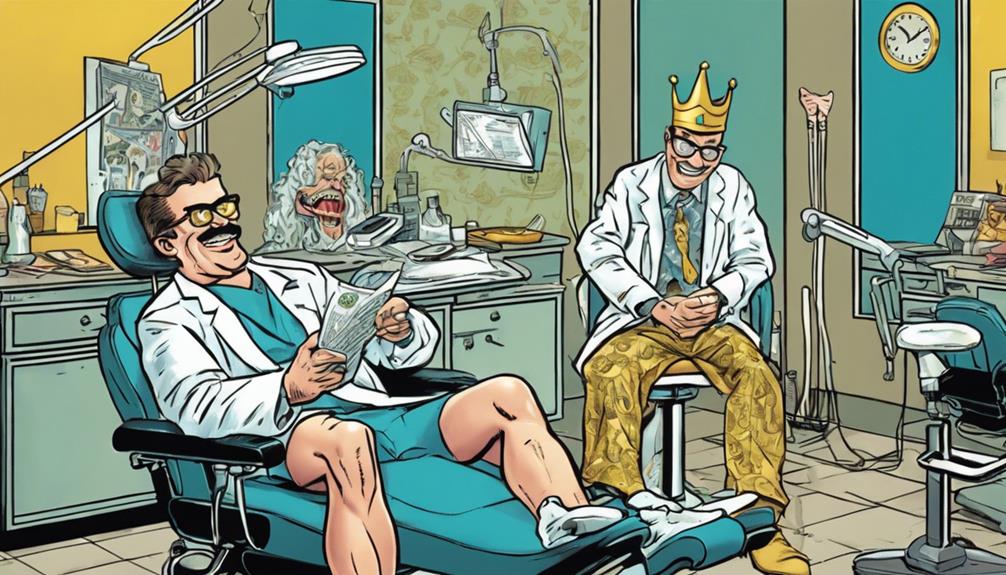You can tell if your dentist is ripping you off by keeping an eye out for unnecessary treatments or overpriced services. If they suggest extensive procedures without clear justification, question their motives. Watch for vague recommendations or pressure to accept cosmetic procedures over simpler alternatives. Check your explanation of benefits (EOB) for discrepancies and compare charges with average costs to see if you're being overcharged. It's smart to get a second opinion on major treatments. Trust your instincts; if something feels off, it probably is. Stick around to explore more ways to protect yourself and your wallet. In addition to looking out for unnecessary treatments and overpriced services, pay attention to the way your dentist communicates with you. If they are dismissive of your concerns or fail to thoroughly explain treatment options, it could be a red flag. Keep an eye out for early signs of gum disease, such as bleeding or swollen gums, as some dentists may push for expensive treatments to address issues that could be managed with simpler means. It’s important to advocate for your own oral health and financial well-being by being informed and proactive in your dental care.
Key Takeaways
- Be wary of extensive treatments or cosmetic procedures recommended without clear justification, as they may indicate unnecessary work.
- Review your Explanation of Benefits (EOB) for discrepancies, unusual charges, or unexpected out-of-pocket expenses.
- Seek second opinions if extensive treatments are suggested; different dentists may have varied approaches and recommendations.
- Understand your dental insurance limitations, including annual caps and covered procedures, to avoid financial surprises.
Recognizing Unnecessary Treatments
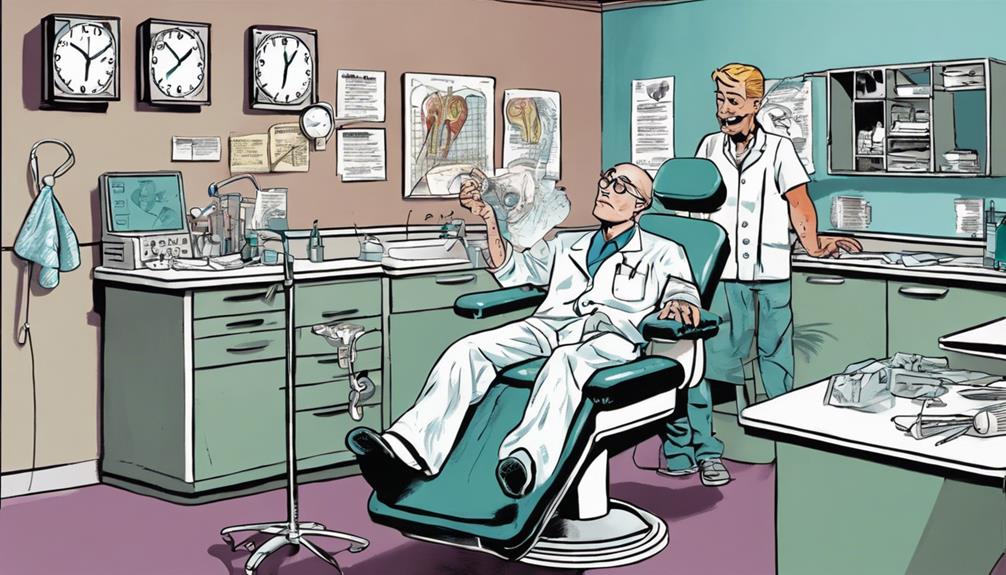
When your dentist suddenly recommends extensive treatments that weren't mentioned in previous visits, it's time to question whether those procedures are truly necessary. You might be facing unnecessary work designed to boost their profits rather than your oral health.
For instance, if your dentist suggests replacing old silver fillings without clear evidence of issues, it's likely an exaggeration. Mercury in those fillings doesn't leach into your body, so replacement may not be warranted.
Additionally, be wary of recommendations for night guards or special fluoride treatments without proper assessment. These items can come with a hefty price tag, and you may not need them at all. Cosmetic procedures, like veneers, often get pushed when simpler, less expensive options, such as whitening, could achieve the same results.
If you notice your dentist suggesting numerous fillings after a routine cleaning, don't hesitate to seek a second opinion. This could save you from unnecessary treatments and expenses that your dental insurance may not cover.
Evaluating Promotional Offers

When you see promotional offers from a dental practice, it's essential to analyze the discount structures closely.
These deals might seem appealing, but they can often hide long-term costs that outweigh your initial savings.
Understanding what's truly included in these promotions will help you make an informed decision about your dental care.
Analyzing Discount Structures
Discount structures can be enticing, but they're often designed to draw you in while masking potential upselling of unnecessary treatments. When you see heavily advertised promotions, it's vital to recognize that these offers might signal a focus on profit rather than genuine patient care.
Dental practices may lure you with discounted exams or x-rays, but once you're in the chair, they could recommend procedures you don't really need. Before you take the bait, evaluate the long-term costs of these promotional offers. Initial savings might seem appealing, but they can easily be overshadowed by expensive treatments suggested during your visit. Always ask about the specifics of any discount structures, ensuring they align with your actual dental needs.
Additionally, consider seeking referrals from people you trust instead of relying solely on promotional deals. A dentist who prioritizes patient care over marketing strategies is likely to provide a better experience and more honest recommendations.
Understanding Hidden Costs
Evaluating promotional offers requires a keen eye to uncover hidden costs that could inflate your overall dental expenses. While low-cost exams and X-rays may seem appealing, they often lead to recommendations for unnecessary treatments. This can greatly increase your long-term expenses. You should be cautious of dentists who employ aggressive marketing tactics; their focus might be more on profit than on your care.
Remember that dental insurance usually has annual caps and limits on coverage, which means those shiny promotional offers mightn't align with your actual dental needs. It's essential to research the average costs for common procedures to determine whether these offers are genuinely beneficial or just a clever way to upsell additional services.
Instead of relying solely on promotional deals, consider seeking referrals from trusted sources. Word-of-mouth recommendations can lead you to dentists who prioritize patient care over profit-driven tactics.
Ultimately, being informed about these hidden costs and motivations behind promotional offers will empower you to make better decisions regarding your dental health and finances. Stay vigilant and make sure you're not caught off guard by unexpected expenses.
Understanding Cosmetic Procedures
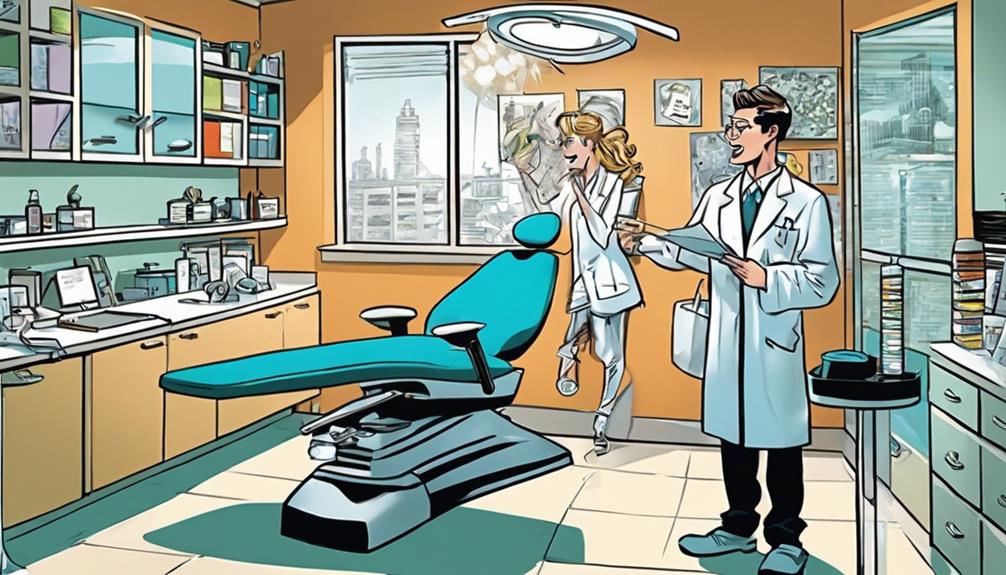
When considering cosmetic procedures, you need to weigh the cost against your actual dental needs.
It's essential to evaluate whether the treatment is justified or if there are alternatives that might meet your aesthetic goals without breaking the bank.
Understanding these factors can empower you to make smarter choices and avoid unnecessary expenses.
Cost Vs. Necessity
Steering through the world of cosmetic dental procedures requires a keen understanding of the difference between what you want and what you truly need for your oral health. While some cosmetic treatments can enhance your smile, they often come with a hefty price tag. It's vital to weigh the cost against necessity.
Consider the following table that outlines common cosmetic procedures and their alternatives:
| Procedure | Estimated Cost | Alternative Option |
|---|---|---|
| Veneers | $1,000 – $2,500 each | Teeth whitening ($300) |
| Invisalign | $3,000 – $8,000 | Traditional braces ($2,000) |
| Dental crowns | $1,000 – $3,500 | Fillings ($200 – $500) |
| Gum contouring | $1,000 – $3,000 | Orthodontics |
| Smile makeover | $5,000 – $30,000 | Basic restorative care |
Dentists might push for cosmetic procedures, but it's important to assess whether these treatments genuinely address your dental health needs. If a dentist pressures you into costly cosmetic treatments without clear justification, it's a red flag. Always prioritize your oral health over aesthetics to avoid unnecessary expenses.
Evaluating Treatment Justification
Understanding the justification behind cosmetic procedures can help you determine if they're truly necessary or just a sales pitch from your dentist. When evaluating treatment justification, take a close look at the recommendations being presented. Cosmetic procedures, like veneers, can cost thousands of dollars, so it's essential to assess if they address legitimate dental needs or merely aesthetic desires.
Not every patient requires these enhancements. Ask your dentist for clear explanations about why a specific treatment is needed. If the justification feels vague or rushed, it could be a red flag. Dentists should provide transparency in treatment recommendations, making sure you fully understand the necessity and options available.
If you feel pressured into a cosmetic procedure, don't hesitate to seek a second opinion. This step not only empowers you but also helps validate whether suggested treatments are appropriate. Remember, less expensive alternatives, such as teeth whitening, may suffice for issues like discoloration.
Alternatives to Cosmetic Procedures
There are plenty of effective alternatives to costly cosmetic procedures that can enhance your smile without breaking the bank. If you're considering a cosmetic choice like veneers, remember that they can be an expensive treatment, often running into thousands of dollars. Before committing, it's wise to consult a prosthodontist who can help you determine if this is truly necessary for your dental needs.
Not everyone requires extensive cosmetic treatments. By taking the time to understand your motivations for seeking such procedures, you can avoid unnecessary expenses. For many, non-invasive options like professional teeth whitening, bonding, or even orthodontics may provide satisfactory results without the high costs and permanence associated with more invasive procedures.
Additionally, stay aware of potential profit motives behind your dentist's recommendations. Knowing this can empower you to make informed decisions about your dental care. By exploring these alternatives, you can achieve a beautiful smile while keeping your budget intact.
Always discuss your options thoroughly with your dentist to ascertain that you're making the best choice for your needs and financial situation.
Analyzing Insurance Limitations
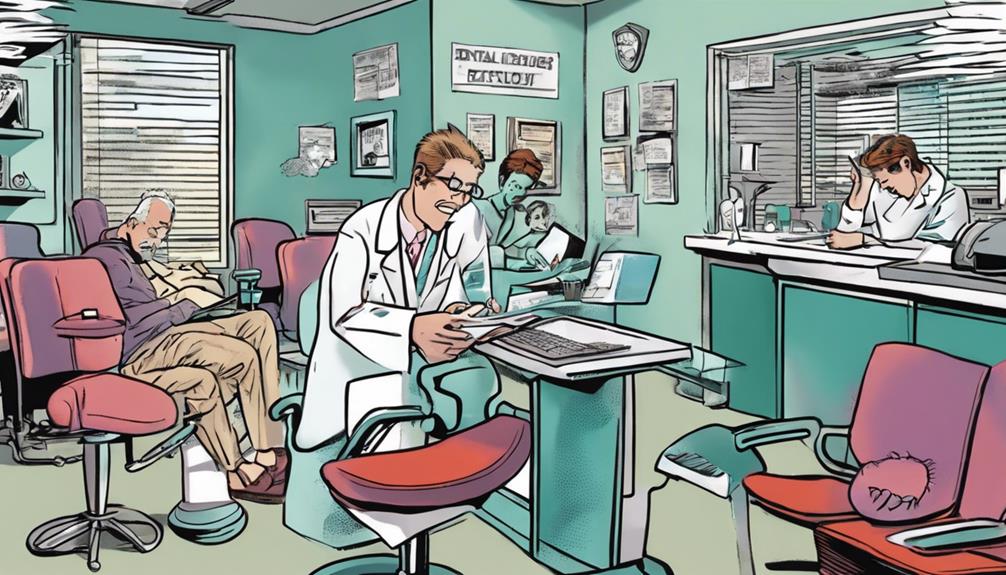
Analyzing your dental insurance limitations is vital to avoid unexpected costs and affirm you receive the care you truly need. Many insurance plans come with coverage limitations, including annual caps on how much they'll reimburse for treatments. This can leave you footing a hefty bill if you require extensive dental work.
Before you undergo any procedures, take the time to review your plan. Understand what's covered and what's not, as some treatments mightn't be included at all. This knowledge is essential in preventing unexpected expenses that could arise from uncovered procedures.
Pay close attention to your Explanation of Benefits (EOB) after your visits. This document outlines what your insurance should cover and highlights any discrepancies. If you notice charges for services that should have been covered, don't hesitate to question your dentist or the billing department.
Furthermore, consider the benefits of choosing a dentist who's in-network with your insurance. This can lead to clearer pricing structures and less likelihood of being upsold on unnecessary treatments. Taking these steps helps affirm you receive fair and appropriate dental care.
Importance of Patient Records

Maintaining accurate patient records is essential for guaranteeing you receive appropriate and effective dental care. Your dentist should establish a thorough patient history, which serves as a foundation for informed treatment decisions. This means that your dental records must be regularly updated and referenced to create accurate treatment plans tailored to your needs.
If your dentist seems unconcerned about obtaining or referencing your previous dental records, it could indicate negligence or a lack of attention to your health history. This is particularly important when it comes to procedures that may require X-rays; unnecessary exposure can be harmful. By reviewing your past records, your dentist can determine whether such imaging is truly necessary, thereby prioritizing your safety.
You have a legal right to access your dental records, including any X-rays, whenever you request them. If your dentist hesitates to provide this information, it's a red flag. Good dental practices guarantee that they maintain and utilize patient records effectively to deliver the best care possible.
Always pay attention to how your dentist manages your records—it could be a telling sign of their overall approach to your health.
Seeking Second Opinions
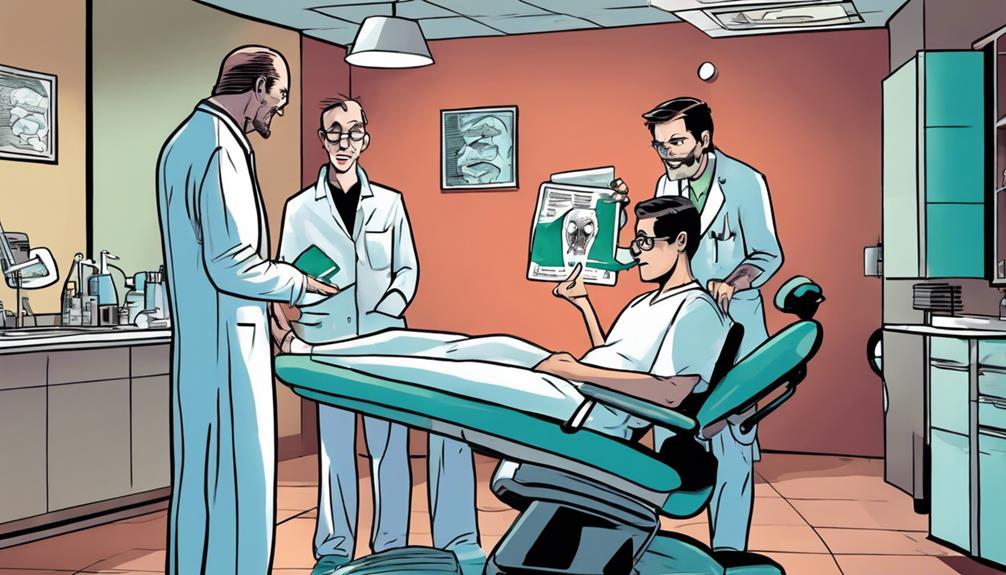
Seeking a second opinion can help you gain clarity on treatment recommendations and guarantee you're not being steered towards unnecessary procedures.
If your dentist suggests extensive or expensive treatments that don't seem to match your symptoms, it's wise to consult another professional. This is especially important when aggressive interventions, like multiple fillings or root canals, are recommended without clear justification.
You have the right to request your dental records and X-rays from your first dentist. Sharing these documents with a second dentist allows for a thorough evaluation of your dental care needs.
Many patients discover that different dentists have varying approaches to treatments, which highlights the significance of obtaining multiple opinions. This can help assure that the recommendations you receive align with best practices and your individual circumstances.
Examining Your EOB Statement

Your Explanation of Benefits (EOB) statement is an essential tool for understanding the charges from your dentist and ensuring you're not overpaying for services. It breaks down the services billed, showing how much your insurance covers and what you owe.
Start by reviewing the EOB for any discrepancies. Look for services you didn't receive or charges that seem unusually high for routine procedures. These could indicate potential overbilling or unnecessary treatments.
Make sure that the patient responsibility amounts match your understanding of your insurance coverage and deductibles. If you spot any errors, report them to your insurer immediately. Familiarizing yourself with average costs for common dental procedures can help you assess if the charges on your EOB are reasonable or inflated.
It's also wise to keep a copy of your EOB for future reference. This can be handy if you need to dispute any charges or seek a second opinion on recommended treatments based on what was billed.
Trusting Your Dentist's Judgment
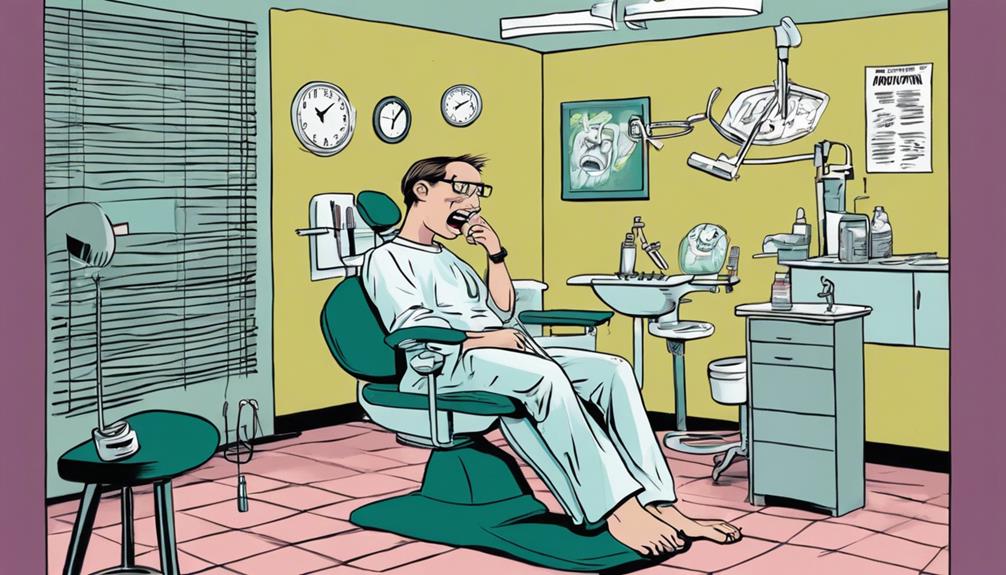
Trusting a dentist's judgment relies heavily on their ability to communicate clearly and transparently about treatment options and recommendations. When your dentist explains the rationale behind suggested treatments, it builds your confidence in their expertise.
Here are some key points to take into account:
- Make certain your dentist uses technology, like intraoral cameras, to show the need for procedures.
- Don't hesitate to ask questions; ethical dentists prioritize your interests and are open to discussing options.
- Trust your instincts; if a treatment seems urgent or excessive without clear symptoms, it might be wise to seek a second opinion.
Trusting your dentist means feeling comfortable discussing your concerns and understanding their recommendations. If you ever feel uncertain, seeking a second opinion can provide the reassurance you need.
It's crucial to have a dentist who values your input and helps you understand your treatment options to avoid feeling ripped off. Ultimately, your comfort and confidence in their judgment should always come first.
Managing Dental Costs Effectively
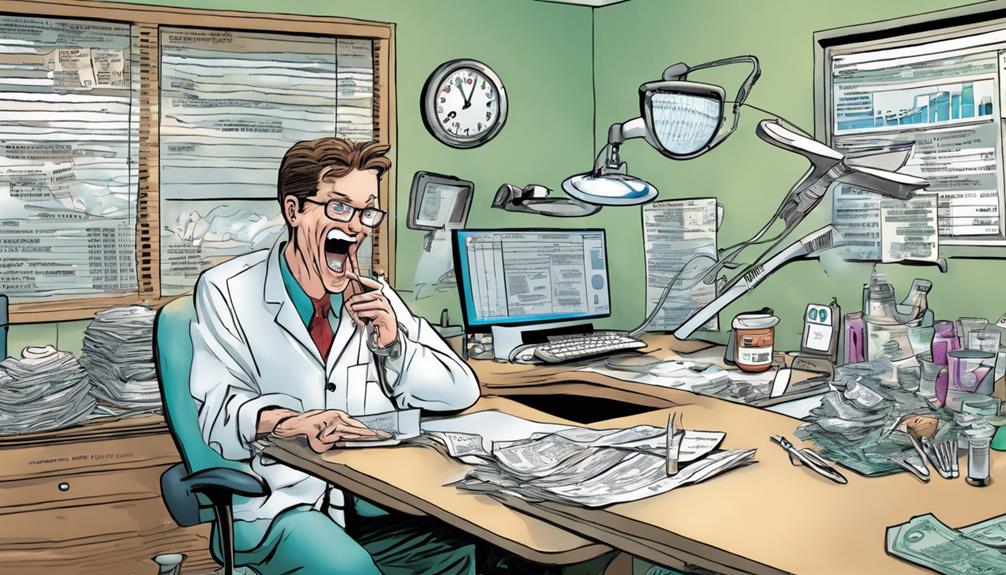
Feeling comfortable with your dentist's recommendations can help you better manage dental costs and avoid unexpected expenses. Start by obtaining multiple quotes for any dental work you need. Prices can vary greatly between practices, and getting comparisons can help you avoid getting ripped off.
Research the average costs for common treatments to establish a baseline, so you can spot any discrepancies in your dentist's pricing. Before proceeding with any procedures, review your Explanation of Benefits (EOB) carefully. Make sure that all listed procedures are legitimate and accurately reflect your treatment.
Additionally, verify your insurance coverage and benefits beforehand. Understanding your plan can prevent unexpected out-of-pocket expenses due to limitations in your coverage. Regular dental check-ups are key, too. They allow you to monitor your oral health without undue pressure for unnecessary treatments.
This way, you can make informed decisions about your care and keep costs manageable. By staying proactive and informed, you'll navigate your dental needs effectively and guarantee you're not paying more than you should.
Frequently Asked Questions
How Do You Know When a Dentist Is Scamming You?
You'll know a dentist might be scamming you if they push unnecessary treatments after routine exams, pressure you for quick decisions, or refuse to share records. Trust your instincts and seek a second opinion when unsure.
What Are the Signs of a Bad Dentist?
Imagine a magician revealing tricks; similarly, a bad dentist hides details. If you feel pressured, receive excessive treatment recommendations, or encounter vague answers, trust your instincts and seek a second opinion to guarantee your dental health.
Do Dentists Give Fillings Unnecessarily?
Dentists might recommend fillings unnecessarily, especially if they suggest replacements without visible decay or pain. Always question aggressive treatment plans, and don't hesitate to seek a second opinion to guarantee your dental needs are met appropriately.
What Should You Not Say to a Dentist?
When talking to your dentist, don't mention insurance as a deciding factor, admit limited knowledge about procedures, express urgency for treatment, or share past negative experiences. Instead, stay confident and open to discussions.
Can Stress from Being Ripped Off by a Dentist Affect Your Dental Health?
The link between stress and dental health is significant, as being ripped off by a dentist can create a lot of stress. This can lead to clenching or grinding of teeth, causing damage to the enamel and even leading to tooth decay. Managing stress is crucial for maintaining good dental health.
Conclusion
As you navigate the dental landscape, keep your eyes wide open like a hawk in search of prey. Trust your instincts—if something feels off, dig deeper.
Stay informed about treatments, promotions, and insurance details, and don't hesitate to seek a second opinion.
By arming yourself with knowledge and vigilance, you can dodge those hidden traps and guarantee your smile shines bright without breaking the bank.
Your dental health deserves nothing less than honesty and transparency.
